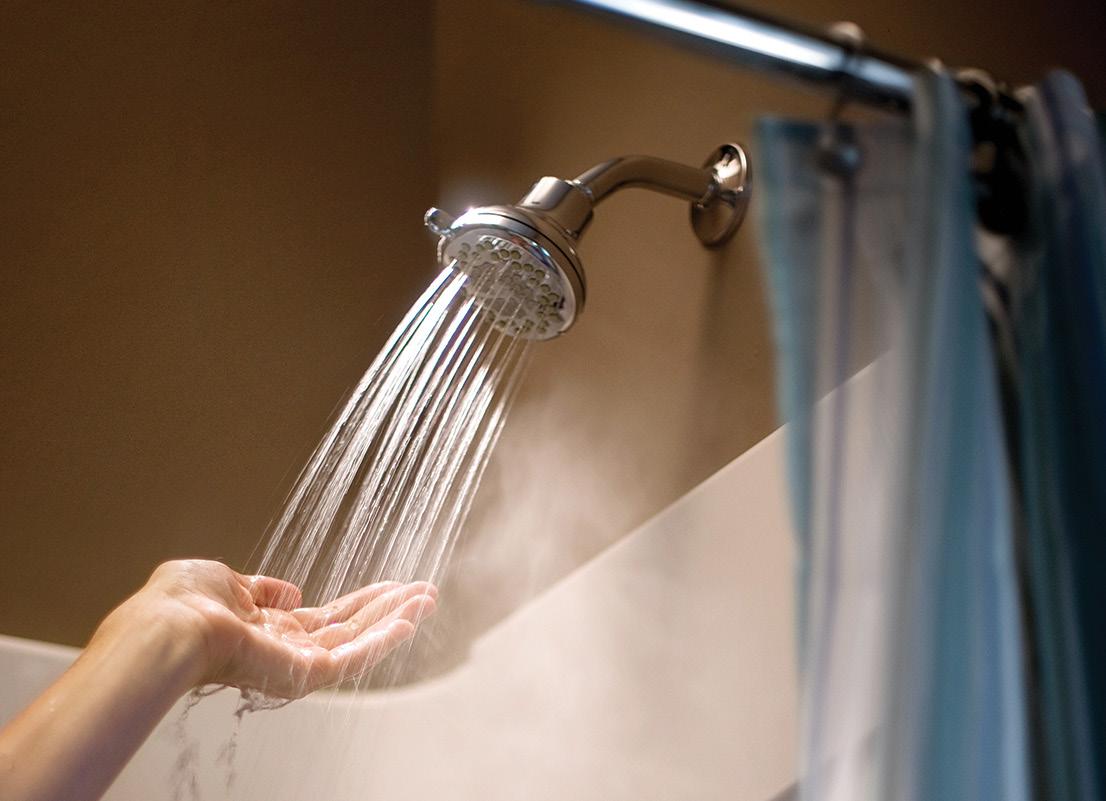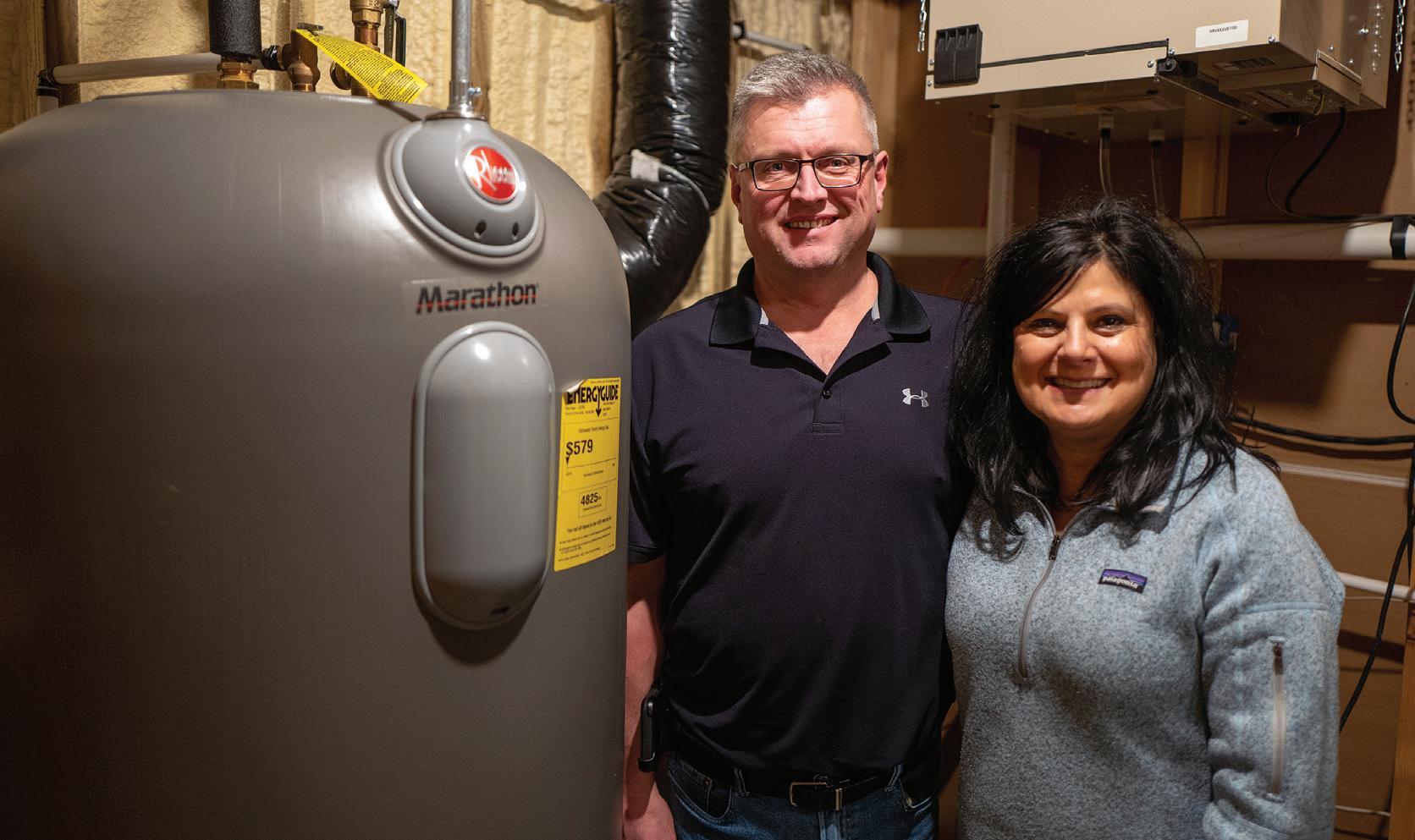
5 minute read
Electric Water Heating
ELECTRIC WATER HEATERS
Up to 20% of the energy used in your home is for water heating, and that becomes a large portion of your monthly energy bill. By upgrading to a largecapacity electric water heater, you can save money and never worry about running out of warm water.
A large-capacity electric water heater can be set up on your utility’s off-peak program to draw heat energy during lower-demand times of day. The water is heated inside a specially insulated tank, which allows almost no heat loss over a 24-hour period. It’s ready to deploy hot water when you need it for showers, dishwashers, laundry – you name it.
BENEFITS
SAVINGS – Not only will your new electric water heater qualify for a lower off-peak electricity rate (up to half as much as the standard rate), but you can also receive hundreds of dollars in rebates for installing one. They are often more efficient than gas or propane water heaters, saving you even more.
EASE – Electric water heaters are easy to install without the need for complicated venting, gas connections or fuel tanks.
RELIABILITY – With a large-capacity electric model, your hot water will always be there when you need it. New electric water heater tanks are built to last, with sufficient insulation (at least 2 inches of foam for an R-16 insulation value) and optional corrosion protection.
WATER HEATING EFFICIENCY TIPS
• Set your water heater temperature at 120 degrees. For each 10-degree reduction in water temperature, you can save about 5% in energy costs.
• Install low-flow showerheads and aerators on sink faucets. These measures save money by reducing hot water use.
• Insulate your electric hot-water storage tank. If your water heater is located in an unconditioned space, consider installing a thermal wrap around it. Take care to install it in accordance with the tank and wrap manufacturer’s instructions.
• Try washing clothes with warm water and rinsing with cold water.
• Drain a quart of water from your water tank every three months to remove sediment that impedes heat transfer and lowers the efficiency of your heater.
ELECTRIC WATER HEATING
The Seversons’ story
When Ryan and Lisa Severson built their Roseau, Minn., home in 2015, two priorities rose above the rest – efficiency and family. The couple needed a house that reflected their careers as energy experts (Ryan as an assistant manager at Roseau Electric Cooperative and Lisa as an energy conservation coordinator for Minnkota Power Cooperative), but they also wanted a space to comfortably host their growing family.
“Right now we only have one son at home, but when we have the whole crew here – which is six kids and their families – we’ve never run out of hot water,” Ryan said.
That’s because the Seversons installed a largecapacity, 105-gallon Marathon electric water heater. The highly efficient equipment stores enough hot water to meet the needs of any holiday, birthday or “just because” family gathering.
“We’ll be running the dishwasher, and laundry for the towels, and everyone will be showering and getting ready,” Lisa said. “Enough hot water is something we’ve never really had to worry about.”
The Seversons’ electric water heater is set up on Roseau Municipal Utilities’ off-peak program, which allows the equipment to be turned off during high-demand times of day. The water is heated when electricity demand is low, often overnight, and remains warm until it’s needed.
“I’ve seen a couple water heaters in my day,” Ryan said, joking about his 30 years in the electricity business. “The bottom line is the efficiency has improved, because of how well they’re insulated. It’s not only when you’re at home utilizing it. If you’re not pulling any water out of it, it hardly has to run. It can go a couple days and not lose 10 degrees if you shut it off. That’s one of the things that sold us on it.”
On top of the reliability and efficiency of the large-capacity water heater, the Seversons enjoy the additional benefit of the off-peak electric rate, which is nearly half of the standard rate. They also utilize the off-peak program for their cold-climate heat pump and other electric heat circuits in their home and shop.
Cooperatives and utilities across Minnesota and North Dakota also offer large rebates to cover the cost of a new electric water heater, so it’s important to reach out to your power provider to see how they can help you get started. If you ask Ryan how the off-peak incentives add up, he will smile knowingly and give you the simple answer. “It’s huge savings,” he said.
“Now, with all of the rebates available, it’s kind of an easy choice,” Lisa added. “Our water heater was a no-brainer based on our experience working in the industry.”
– Ryan Severson







